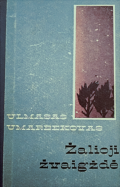 Original language:
Uzbek
Original language:
Uzbek Translated from: Uzbek
Authors: Umarbekovas, Ulmasas
Translated by: Kobeckaitė, Halina
Published in: Vilnius
Published on: 1975
Publisher: Vaga
“Education isn’t hard. Being human is hard.” – a phrase told more than twice in the book that sums up the idea behind Ulmas Umarbekov’s novel “The Green Star” (alternatively known by its original title “It Is Hard to Be Human”). It is a coming-of-age-type of story where the biggest focus is on two of its characters, Abdullah and Gyulchehra, centering heavily on the dynamics and change, as well as the fate of their relationship.
The first pages of the book starts with a short fairytale about a padishah and his son, who after his birth was foretold to become an exceptionally talented and smart man. And such he became, living in luxury and holding a lot of power in his hands after his father’s death. However, the lack of empathy and humanity in the son’s words and actions was what let padishah to his death and what made the people of his kingdom turn their backs on padishah’s son while others perished under the son’s rule, leaving the new ruler all by himself, driving him to loneliness and heavy guilt after realizing the error of his ways.
The motif of this fairytale is a re-occurring theme in the main story as well. The boy Abdullah puts heavy emphasis on the importance of constantly being above and ahead of people, especially in the field of academia, as a way to validate his worth to others, as well as surpass them. On the way to his goal, he gets back in touch with an old childhood friend of his, a girl named Gyulchehra, and they end up falling in love with each other. While Gyulchehra tries to convince Abdullah to stay in their hometown and pursue his studies long-distance, the boy decides to study in a far-away city, giving a promise to Gyulchehra to stay in touch and visit her during the holidays. At first, Abdullah follows through with his promise but despite that, as time goes by, he becomes more distant and stops taking the feelings of the people who care about him into consideration, turning into an extensively pragmatic person. When faced with heavy situations or dilemmas due to several grave mistakes he had committed, Abdullah, now a young man, tries to downplay the damage and avoid any responsibility, costing him the trust and love from those closest to him.
While the novel starts out as something that younger audiences can easily relate to due to the first part revolving very much around the passionate puppy love between Abdullah and Gyulchehra in their teenage years, the second part of the book takes a dark turn, albeit in a cliché, yet tragic way, leaving Abdullah a broken man.
Ulmas Umarbekov (1934—1994) was an Uzbek writer and screenwriter from Tashkent where he finished his journalist’s degree at the National University of Tashkent. After having worked at the Committee of television and radio broadcasting for some time, he later established and worked as a director in his studio “Uzbekfilm”. Most of Umarbekov’s works contrast urban and country life, however, the biggest attention is paid around the troubles and hardships of youth and the challenges of entering adulthood, as well as the choices and impact made by young inexperienced people in the context of morale.
